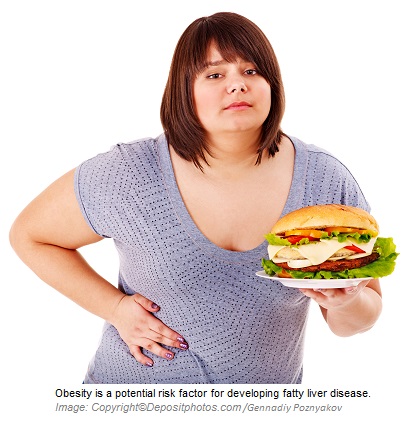Fatty liver disease (FLD) is a medical condition in which excess fat accumulates in  the liver, forming at least 5 – 10 % of the weight of the liver. The principle fat that builds up in the liver is triglyceride (TG). Fatty liver disease usually has no symptoms. However, some people might experience abdominal discomfort and fatigue.
the liver, forming at least 5 – 10 % of the weight of the liver. The principle fat that builds up in the liver is triglyceride (TG). Fatty liver disease usually has no symptoms. However, some people might experience abdominal discomfort and fatigue.
 the liver, forming at least 5 – 10 % of the weight of the liver. The principle fat that builds up in the liver is triglyceride (TG). Fatty liver disease usually has no symptoms. However, some people might experience abdominal discomfort and fatigue.
the liver, forming at least 5 – 10 % of the weight of the liver. The principle fat that builds up in the liver is triglyceride (TG). Fatty liver disease usually has no symptoms. However, some people might experience abdominal discomfort and fatigue.Potential contributing factors for developing fatty liver disease:
- Genetics.
- Alcohol.
- Obesity.
- Medical conditions:
- Diabetes.
- Hypertension.
- Dyslipidemia.
- Insulin resistance.
- Glycogen storage disease.
- Pregnancy.
- Medications: amiodarone, corticosteroids, allopurinol, high dose of tetracycline, valproid acid, zidovudine, asparaginase, methotrexate, tamoxifen, and diltiazem.
- Inflammatory bowel disease.
- Nutritional factors:
- Malnutrition, especially protein deficiency
- Total parenteral nutrition (TPN).
- Rapid weight loss.
- Bariatric surgery for obesity.
Nutritional Supports:
Restricted Foods:
- Saturated, hydrogenated, and Trans – fats.
- Sugars and sweets.
- Fried foods.
- Processed foods.
- Margarine.
- Sodas.
- Alcohol.
- Foods with glycemic index over 55, such as cakes, pastries, cookies, muffins, doughnuts, white breads, and dressings.
- High fat dairy products.
- Egg yolks.
- Pork.
- Beef liver.
- Artificial sweeteners.
- Vegetable shortenings (shortening is a fat that is solid at room temperature and is used in cooking, baking, grilling and making pastries).
- Foods additives, preservatives, and colorings
Recommended Foods:
- Drink plenty of water: at least 2 liters a day.
- Whole grains.
- Foods high in fiber: lentils, beans, avocado, oats, and artichoke.
- Foods high in omega-3: fish, flaxseeds, chia, and hemp seeds.
- Fruits and vegetables high in flavonoids: berries, red grapes, grapefruit, pomegranate, sea buckthorn, persimmon, kiwi, beets, basil, garlic, parsley, radish, radicchio, rhubarb and parsnips.
- Garlic.
- Onion.
- Beets.It contains betaine that has a protective effect against fatty liver.
- Foods with glycemic index less than 55 (see “Glycemic Index” under the section of “Carbohydrates”).
- Nuts.
- Spices: cinnamon, turmeric, oregano, basil, cayenne, sumac, and rosemary.
- Ginger.
- Turmeric.
- Chlorella and spirulina.
- Fruits and vegetables high in phytosterols: acai berry, goji berry, lemon, persimmon, plum, sea buckthorn, strawberry, alfalfa sprouts, amaranth, avocado, beets, bell pepper, cabbage, celery, cucumber, eggplant, onion, tomatoes, turnip, turnip greens, and yams.
- Green tea.
- Maitake mushroom. It contains beta-D-glucan that lowers both LDL and TG levels.
Recommended Supplements:
- French Maritime Pine Bark Extract: 200 – 300 mg a day. It is a potent antioxidant that can help lower blood sugar and cholesterol and improves blood circulation.
- Grape Seed Extract: 100 – 200 mg a day.
- Curcumin: 1000 – 1500 mg a day. It is a powerful antioxidant that detoxifies the liver.
- Omega – 3 Fatty Acids: 1– 1.5 grams a day. They lower TG level.
- Beta – Glucan: 3 – 10 grams a day. Beta-glucan is a type of fiber found in oats, barley, and maitake mushroom and can lower cholesterol.
- Milk Thistle Extract (containing 80% silymarin): 600 – 900 mg a day. It has a liver detoxifying effect.
- Betaine Citrate or Aspartate: 3000 – 6000 mg a day. It helps especially with alcohol-induced fatty liver. Betaine hydrochloride is mostly used in people with poor digestion and low gastric acid secretion.
- Dandelion Extract: Dandelion root: as a dried form, 5 – 15 grams a day, or as a tincture 10 – 30 ml day. It contains taraxacin that improves digestion, increases bile production, and has a laxative effect.
- Pantethine: 900 mg a day. It is an active form of vitamin B5 and reduces total cholesterol, LDL and TG and increases HDL level.
- Vitamin E: 400 – 800 IU a day.
- L- Carnitine: 1000 – 3000 mg a day. It inhibits and even reverses alcohol-induced fatty liver disease. It also helps lower cholesterol and TG levels.
- PGX: 3000 – 4500 mg a day. It is a water-soluble fiber that helps lower blood sugar and cholesterol levels.
- Fenugreek: 10 – 40 grams a day, or as tincture 3 – 4 ml up to three times a day. This herb helps lower blood sugar, LDL and TG levels. The active ingredients responsible for its benefits are trigonelline, lysine, L-tryptophan, and saponins.
- Psyllium: 5 – 20 grams a day. It is a bulk-forming laxative that contains insoluble fiber and mucilage. It is generally used for constipation, and it may reduce cholesterol and blood sugar levels as well.
- Garlic: 600 – 900 mg a day. The active ingredients in garlic are allicin, ajoene, alliin, flavonoids, and phenolic compounds. They reduce both LDL and TG and increases HDL.
- Digestive Enzymes: A full spectrum product.
- Probiotics: a product that provides 5 to 10 billion organisms per serving.
- Vitamin B – Complex: A high potency product.
Miscellaneous Suggestions:
- Exercise.
- Liver detoxification.
- Colon cleansing.

